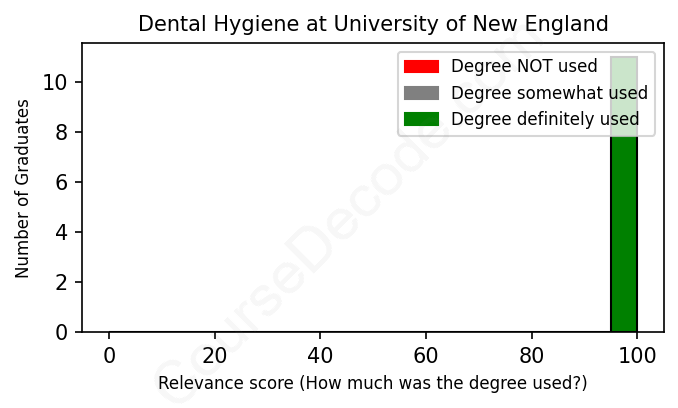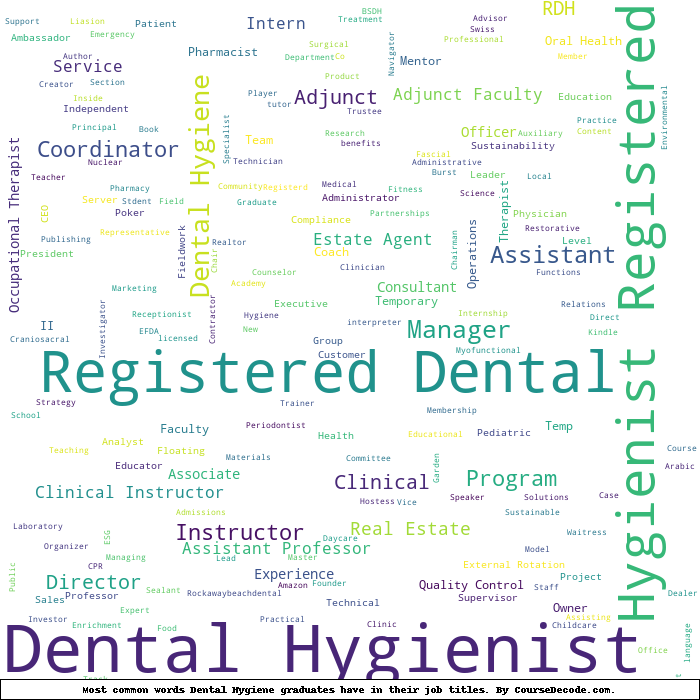
First, some facts. Of the Dental Hygiene graduates from University of New England we've analyzed , here's how many have used (or NOT used) their degree in their career:

These are estimates based on AI analysis of 11 LinkedIn profiles (see below).
The verdict? Fantastic! Overall, with an average relevance score of 100%, Dental Hygiene graduates from University of New England have an exceptionally higher likelihood (+33%) of finding work in this field compared to the average graduate across all fields:
And for comparison, here's the chart for all profiles we've looked at across all degrees.
Also, after graduating, only 18% of these graduates have pursued further education other than another Bachelor's degree (such as a Masters degree or other), compared to the average across all profiles of 35%. This suggests a Bachelors degree is enough for most Dental Hygiene graduates, and it's normal to look for work straight after graduation.
See the details:
|
Relevance score: 100% We think this person has gone into a career highly relevant to their degree. We think this person has gone into a career highly relevant to their degree.
DEGREE INFOGraduated in 2015 from University of New England with a Bachelor's degree in Dental Hygiene. No other secondary education since. JOB HISTORY SINCE GRADUATIONTemporary Dental Hygienist CHILDREN'S DENTISTRY OF SANFORD, LLP Aug 2015 - Feb 2016 Temporary Dental Hygienist  RDH Temps, Inc Nov 2015 - Present Dental Hygienist  Viena Posada, DMD Feb 2016 - Present ABOUTNo information provided. |
The top 10 most common jobs done by the graduates we've analyzed (ranked most common to least) are:
As we take a look at the career paths of graduates from the University of New England who studied Dental Hygiene, it’s clear that the most common job among them is that of Registered Dental Hygienist. This role is highly relevant to their degrees, as it directly involves the application of skills and knowledge gained through their studies, such as patient care, preventive dentistry, and clinical procedures. For instance, many graduates have been working in various dental practices, pediatric dentistry, or temporary hygienist positions, all of which allow them to put their education into practice. It's quite impressive how consistently they've landed in roles that are built on the foundation they created during their time at university.
Almost every job listed is clearly aligned with their degree in Dental Hygiene, making the correlation very strong—these roles are not just a stretch, but rather, they’re exactly what they trained for. There are positions like “Temporary Dental Hygienist,” “Dental Hygienist at various practices,” and even roles that combine clinical responsibilities with management, such as “Managing Clinical Director.” These indicate a healthy job market for their expertise, and it's reassuring to see that graduates have generally found employment opportunities that not only suit their education but also contribute to meaningful careers in dental health. Overall, it seems like those who graduated from this program have successfully transitioned into relevant roles that utilize their skills daily—so yeah, they really made the most of their degree!
Here is a visual representation of the most common words in job titles for Dental Hygiene graduates (this is across all Dental Hygiene graduates we've analyzed, not just those who went to University of New England):

Alright, so let's break down the career paths of graduates from the University of New England who studied Dental Hygiene. Looking at the data you've got, it’s clear that the majority of these individuals kick-start their careers as dental hygienists straight after graduation, which aligns perfectly with their degree. Most seem to land jobs in various dental practices, clinics, and even get opportunities for temp positions shortly after they toss their caps in the air. For example, many started as registered dental hygienists at well-known practices and remained in those roles for several years, indicating a solid transition from education to employment. It's promising to see that their first jobs are in relevant, stable positions within the dental hygiene field.
Fast forward five to ten years after graduation, and the picture remains quite favorable. A lot of these hygienists are still working in dental practices, enjoying continuity in their careers which suggests they’ve built good professional reputations. Some have even moved into roles with more responsibility, like managing directors or clinical instructors. However, there are also instances where graduates float between temp positions for a bit, but eventually, they find stable employment again. Overall, the career trajectories point towards a strong trend of professional stability and growth in the field of dental hygiene, showing that these graduates have generally found relevant and successful career paths in their chosen field. So, if you're considering dental hygiene, it sounds like a solid choice with decent long-term prospects!
Getting a Bachelor’s degree in Dental Hygiene can be a bit challenging, but it’s definitely manageable if you’re dedicated and organized. The program usually combines a good mix of science courses, hands-on clinical practice, and some coursework on patient care and dental ethics, so it requires a solid grasp of biology and communication skills. At the University of New England, like many other schools, you’ll need to stay on top of your studies and be prepared for a rigorous schedule. It might be a bit tougher than some other bachelor’s degrees because of the technical and practical skills involved, but if you’re passionate about it, you’ll likely find it rewarding and fulfilling!
Most commonly, in the LinkedIn profiles we've looked at, it takes people 3 years to finish a Bachelor degree in Dental Hygiene.
Looking at the career paths of these Dental Hygiene graduates from the University of New England, it seems they’re doing pretty well financially compared to many other jobs out there. Most of them have been consistently employed in dental hygiene roles, often at various clinics, which suggests they’re able to find work and gain experience fairly easily. Although we don't have exact salary figures, dental hygienists typically earn a decent wage, especially depending on the location and the type of practice. Plus, some have even moved into roles like managing clinical directors or teaching, which usually come with higher pay. Overall, it looks like they’ve made a solid choice and are likely making a comfortable living!
Here is a visual representation of the most common words seen in the "about" section of LinkedIn profiles who have a Bachelor degree in Dental Hygiene (this is across all Dental Hygiene graduates we've analyzed, not just those who went to University of New England). This may or may not be useful:

Here are all colleges offering a Bachelor degree in Dental Hygiene (ordered by the average relevance score of their Dental Hygiene graduates, best to worst) where we have analyzed at least 10 of their graduates:
| College | Score | Count |
|---|---|---|
 University of New England University of New England
|
100 | 11 |